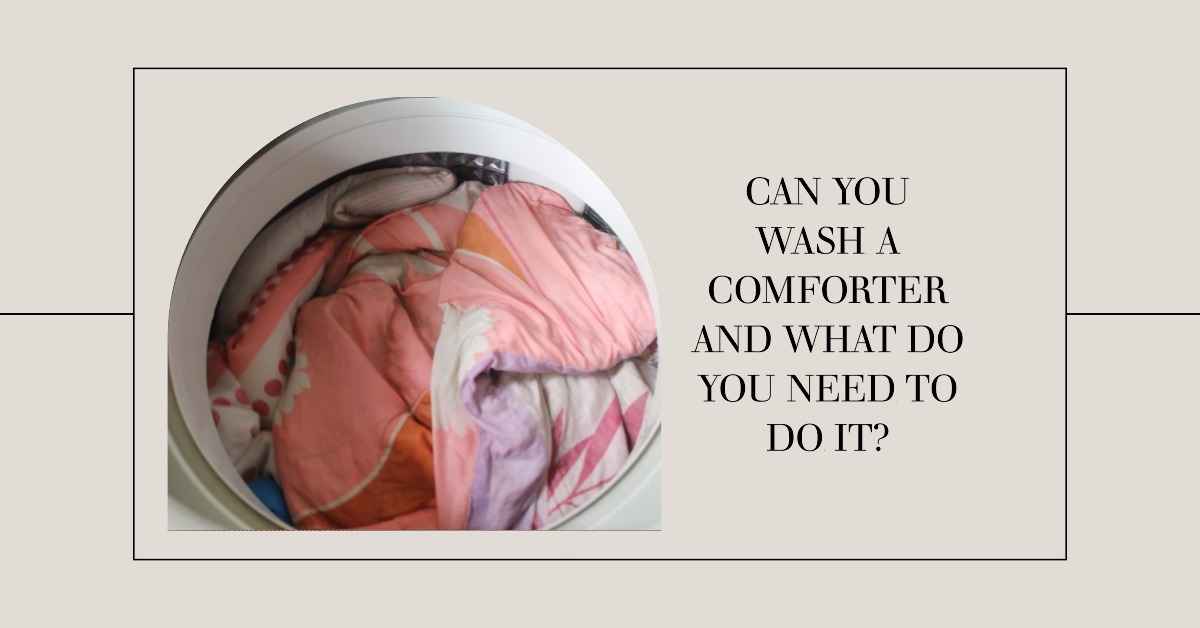
How Often to Wash Your Comforter and How Is It Done?
The age-old question: How often to wash your comforter? Is it something you can throw in with other bedding every few weeks? Also, is there a difference between washing down and regular comforters?
If this has been your train of thought recently, you’ve come to the right place. We’ll break down washing frequency, important considerations, and the complete guide on keeping bedding clean.
So stay tuned as we break down all care and maintenance facts, as well as cover the most frequently asked questions!
Factors That Determine How Often to Wash Your Comforter
As you probably know, not all comforters were created equally. Not all comforters are made with the same materials and require the same level of care. Also, your daily sleeping routines will determine how often to wash your comforter and how. So here’s what you need to consider.
Material
What type of fabric or material is your comforter made of? Also, what is inside the comforter? Is it a down or does it have something else?
These are some of the questions you should be asking before you can answer how often to wash your comforter.
For example, down bedding and comforters tend to require a bit more TLC. They’re pretty bulky and finicky, which is why it’s best to get them professionally cleaned.
On the other hand, comforters like MyTickie have an underside made of Minky, which tends to be easier to clean.
Duvet Cover — Yay or Nay?
Believe it or not, duvet or comforter covers play a huge role in comforter maintenance. They are the first line of defence when it comes to bedding and can even extend the time between washes.
Covers can protect your comforters from dust and dirt buildup, as well as allow them to stay fresh for a longer time. If you have a duvet cover, you’ll have to wash it every week or so to ensure cleanliness. But it’s still much easier to wash than a comforter, so it shouldn’t be a dealbreaker.
Sharing
Another thing that will determine how often to wash your comforter is whether there’s anyone else in the bed with you. If you’re sharing it with a partner, you’ll have twice the dirt and sweat in the same amount of time.
That also goes for those sharing their beds with pets or kids. Having more people or pets in the bed will usually halve the time between the washes.
Hygiene Habits
When we’re talking about hygiene habits, we’re breaking them down to those who shower in the morning and those who do it before bed.
If you shower before bed, you’re likely not bringing that much dirt and body oils to your bed. That can help extend the time between washes of not only your comforter but other bedding and mattresses, as well.
On the other hand, if you like to shower first thing every morning, you might need to clean your comforter a bit more often.
Another thing to consider here is how much you tend to sweat at night. If you’re overheating during sleep, you’ll need to wash all your bedding on a pretty frequent basis. You should also think about buying bedding that’s more breathable and that allows airflow.
Spills and Stains
Spills and stains are a pretty unavoidable part of life, and they’ll affect even your bed. If you, or the person you’re sharing the bed with, are feeling under the weather, washing your comforter more often will help keep germs at bay. You should do one more wash once you recover to avoid reintroducing germs into your system.
Also, if you enjoy eating and/or drinking in bed, you’ll probably get stains and spills more often. You might have crumbs, which can attract bugs. In that case, as soon as you see a stain, throw your comforter in the wash.
Personal Preferences
How often you end up washing your comforter might also come down to just your personal preference. Some people say that they fall asleep much easier when their bedding is still freshly washed so they clean their bedding once a week.
Others refresh their sheets using other methods to avoid doing the big wash weekly. So knowing how often to wash your comforter can come down solely to your schedule and preference.
How Often to Wash Your Comforter?
Now let’s answer the question we’ve all come here for: How often to wash your comforter?
As you’ve seen from the big list of considerations, there’s not going to be a one-size-fits-all solution. Some people like to do it once a week, some once a month, and some once a year.
With that said, if you have a cover over your comforter, and barring any spills, you can easily get away with washing your comforter once or twice per year. If you’re not using it all year round, you can clean it before use and before putting it in storage.
Of course, the duvet cover itself would need to be washed more often than that, maybe once every few weeks.
But if you don’t have a cover or simply don’t want to use one, experts say it’s best to wash a comforter once every month or so. If there’s a spill or stain, you should treat and clean it immediately, to avoid it settling into the underside. More on that in a second.
Another thing that might determine how often you’ll be washing your comforter is your washing machine. A lot of standard machines simply can’t handle the sheer size and weight of comforters. In that case, you’ll need to take it to a professional.
Should You Wash a Comforter Before the First Use?
When you buy your beautiful new comforter from MyTickie, you might be tempted to put it on your bed immediately. But that’s probably not the best idea.
All MyTickie comforters pass the Oeko-Tex Standard 100, which means they don’t contain any harmful contaminants or materials. And even though they were made with the highest quality fabrics, they should always be washed before first use.
Comforters and other bedding you buy have to be transported to the store or your home. During the packaging and transport, there’s probably going to be a lot of dust in the air.
To avoid irritation, wash immediately, let dry, and fit the comforter on your bed.
How Often to Wash Other Bedding
While we’re on the topic of washing frequency, it might be worth talking about other bedding. Having the right information can help you come up with an efficient laundry schedule.
Pillows
Pillows, like comforters, tend to do best when they’re protected. One of the best ways to avoid having to wash your pillows every other month is by using pillow protectors.
Unlike pillowcases, pillow protectors zip all the way up, not leaving any bit exposed. You can use them together with pillowcases to ensure the best results.
You should wash your pillow protectors every month to remove all hair, dirt, and oils. Using a mild laundry detergent will keep them fresh and clean for a long time.
If you’re not using a pillow protector, you’ll need to take care of your pillows more often. In fact, it’s best to do it every month or every other month at the very least. You can wash a couple of pillows at the same time in most washing machines. It’ll not only save on time and water but washing two at a time will keep your machine balanced.
Blankets
The frequency at which you wash your blankets will depend solely on how often you use them. For decorative blankets that you lay on the side of your bed or furniture, a wash every few months will do. It’s the best practice to avoid dust buildup, which can irritate you.
However, if you sleep with a blanket every night, it’ll need to be cleaned much more often. In fact, doing it every one or two weeks is your safest bet. Just make sure that you’re following the exact care instructions.
Dark or brightly coloured blankets can sometimes bleed colour, ruining other laundry. If you’re worried about this happening, wash them in a separate load.
Sheets & Pillowcases
Most hospitality experts will tell you that the best practice is to wash sheets and pillowcases once a week. Not washing your bedding regularly will allow it to collect dead skin, dirt, oils, and bacteria.
All of that grime can not only lead to tough stains and odour, but also to bacteria and pathogens. As dust mites feed off dead skin cells, their feces can cause extreme irritation for those suffering from allergies.
As with any other piece of bedding, it’s best to first do a visual check and make sure that there aren’t any stains anywhere. If there are, treat those immediately, and then pop your sheets or pillowcases in the wash.
Again, if you can, try to follow the manufacturer’s tag to get the best results. If you can’t find one, a good rule of thumb is to wash sheets in warm water because hot water leads to shrinkage.
Mattress Covers
A mattress cover can add years to your mattress’s life. Not only does it prevent mattress damage, but it also reduces allergies, all while keeping it clean and comfy.
Even though a mattress cover usually isn’t in direct contact with your skin, you should still wash it once a month. Of course, if there are any spills or stains, treat them right away.
Bed Skirts, Curtains, and Canopies
Since bed skirts, curtains, and canopies are all decorative pieces of bedding, they don’t require a lot of attention. You can get away with cleaning them maybe once or twice a year.
If you have allergies, you should consider cleaning and washing every two to three months. All of that decorative bedding can collect and store quite a lot of dust, which can cause irritation.
Mattresses
Even though a mattress isn’t exactly bedding, we still wanted to mention it for good measure. According to experts, you should wash your mattress every six months. Of course, it’s not as easy as throwing it in the washing machine, so you might consider having it professionally cleaned.
In the meantime, to ensure it stays spotless, you can vacuum it once a month. You can also treat most stains and spills with baking soda, which is a toxic-free solution. For tougher stains, you might need an enzyme cleaner.
How to Wash a Comforter
Now that you know how often to wash your comforter and why, it’s time to get to business. Washing a comforter isn’t the most straightforward process, but we’re here to help.
The first thing to do is actually check whether your machine can even wash the comforter. Most top-loading machines have agitators, which can clump and damage your comforter.
Also, make sure that even wet and heavy, your comforter won’t cause any disruptions or damage to your machine. If you can’t be sure that it’ll work, your safest choice is to either take it to a laundromat or have it cleaned by a professional.
Comforters, especially down comforters, tend to be finicky, which is why being gentle is key. You should only use half the measure of a mild laundry detergent and wash it using a gentle setting.
Since comforters are pretty bulky, it’s a good idea to do an extra rinse cycle once the first one is done. That should remove soap buildup, and it’ll speed up the drying process.
If you have a down comforter, you should also add a few dryer balls, stuffed inside two clean, cotton socks when washing. The agitation from the balls will remove the dirt and oils from the bedding.
Hand Washing a Comforter
Sometimes, you might not be able to wash your comforter using a washing machine or at the laundromat. That means that it’s time to do it by hand. Now, the process is as simple as they get, but you might need a bit of muscle to pull it off.
First, treat stains on your comforter if there are any, and then fill your bathtub or sink with lukewarm water. Add the mild laundry detergent of your choice, and you’re ready to go.
Then, you’ll want to, slowly and gently, submerge the comforter fully and agitate it with your hands. When you feel happy with the results, let it sit for another 30 minutes. Your instinct might be to wring or twist the comforter but avoid that at all costs.
After half an hour has passed, carefully take the comforter out of the tub and let it dry. If you want, you can do another soak, this time without any detergent in the water.
Frequently Asked Questions
While we’re answering the question of how often to wash your comforter, we thought that you might need a few other mysteries solved. So here are some of the most frequently asked questions when it comes to comforter care.
How to Find the Right Comforter?
The type of comforter you buy will depend on your personal preferences, budget, and general needs. For example, when do you plan on using this comforter? Is it just for the colder months, or are you using it all year round? What kind of style do you prefer?
Luckily, MyTicky comes to the rescue, no matter the situation. All of our comforters are cozy while staying breathable and soft. They also come in a variety of sizes and styles, so make sure to check them out!
Can You Wash a Down Comforter in the Washing Machine?
Yes, you can, provided you have the right machine. Down gets incredibly heavy when wet, which is why you need to have a large machine. While placing it in, make sure to spread out the down with your hands. Also, be gentle when taking it out to avoid causing any tears.
How to Clean and Maintain a White Comforter
White comforters, like our Boho Chic model, while incredibly stylish, also have a bad reputation when it comes to maintenance. That’s because you can’t use bleach to maintain whiteness, which means it could turn yellow over time.
Well, as long as you take care of it, and treat any and all stains immediately, it shouldn’t be an issue. One trick for white comforters is air drying them. If you can, once you wash your comforter, leave it out in the sun to dry. It will not only breathe some freshness into it but also lighten the fabric.
To Sum Up: How Often to Wash Your Comforter
By now, you’ve hopefully learned how often to wash your comforter and the right steps to take care of it. We also covered cleaning other bedding, which should ensure you’re always sleeping in a clean, soft, and comfortable setting.
If you want to know more about MyTickie products, you can check out our FAQs. And if you need any sort of help when choosing the best comforter or pillowcases for you, don’t hesitate to get in touch with us!



